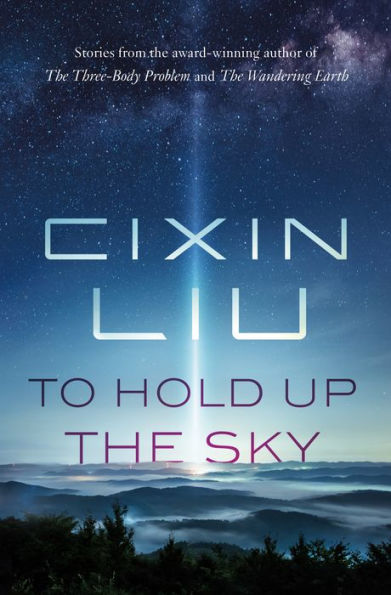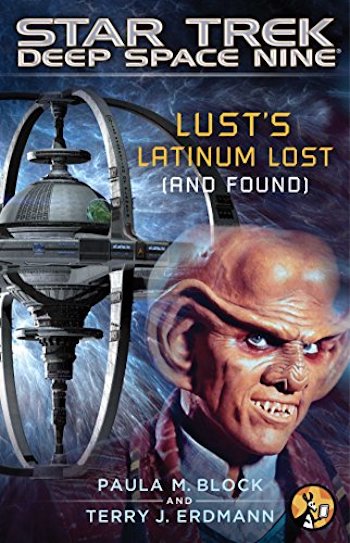Lust’s Latinum Lost (and Found)
Paula M. Block and Terry J. Erdmann
Publication Date: September 2014
Timeline: November 2385; following The Fall: A Ceremony of Losses
Progress: In the aftermath of the events of The Fall miniseries, Quark finds that business is down. An old Boslic freighter captain friend of Quark’s by the name of Rionoj (who appeared in “The Homecoming”, “The Abandoned”, and “Broken Link”) claims to have an advance copy of a new holonovel sure to be a sensation: the fourth interactive installment of the infamous Vulcan Love Slave series, titled Lust’s Latinum Lost.
Once upon a time, Quark, having caught Odo reading erotica, offered to sell Odo his first edition of the original Vulcan Love Slave, so you know this franchise is a big deal. Quark agrees to try out the program, with which he is instantly smitten, but to his disappointment discovers that he’s only been teased with a sample. He simply must find out how the program concludes. Even more disappointing, Rionoj is no longer on the station to provide him with the rest.
In the meantime, a young, somewhat naïve Ferengi by the name of Shmenge, whom a friend of Quark’s mom Ishka has sent to him, arrives on this new incarnation of the fabled space station and becomes Quark’s apprentice. Naturally, when Quark decides to track down Rionoj and purchase the distribution rights of Lust’s Latinum Lost before the competition moves in on the action, Shmenge joins him on his quest.
This mad pursuit takes them to Wrigley’s Pleasure Planet in search of more information about the program’s author and copyright. A series of misadventures and reversals ensues, with Shmenge often suffering the brunt of Quark’s miscalculations.
Eventually we learn that the enterprising Pel worked out a package deal with T’lana, both a holoprogrammer and the actress that plays the eponymous character in this holonovel series, and then partnered up with Rionoj to transport the program for her. As if that weren’t enough to elicit Quark’s dismay and disgust, Pel is also coauthor of the program’s story. In fact, she is collaborating with other Ferengi women to develop a “whole line of holoprograms aimed at fe-males.” Swallowing his distaste, Quark pays for a six-month exclusive.
He then discovers he has to negotiate with Shmenge as well in order to gain the exclusive on some additional hot new programs that were mixed in with the promotional swag that Shmenge picked up at Wrigley’s Pleasure Planet. To add insult to injury, when Quark tries to invoice Grand Nagus Rom for his embassy-related costs of operation, he learns that Rom has a new female finance minister, and under her advisement he’ll only cover a single line item in Quark’s bill, that which pertains to “protecting the life of the ambassador.”
Despite being outmaneuvered on these various fronts, the surge in holosuite activity injects new life into Quark’s business, and all’s well that ends well.
Behind the lines: Prior to the publication of this novella, Paula M. Block and Terry J. Erdmann were known to Trek readers as prolific, high-quality authors of Trek-related non-fiction, most relevantly the Star Trek: Deep Space Nine Companion. Over time I have acquired all of Block and Erdmann’s Trek reference materials, and I recommend them all, but if you’re going to get just one, make it the DS9 companion, a truly invaluable resource. This work of fiction, then, would be of interest in the relaunch series simply for marking Block and Erdmann’s transition from non-fiction to fiction. Fortunately, it rises well above the status of mere literary curio, delivering a consistently entertaining, often laugh-out-loud funny Ferengi romp that offers a welcome respite from the weightiness of the preceding volumes.
The last time the relaunch series dove into Ferengi culture and followed up on our beloved Ferengi characters, I took the opportunity to provide my score for every Ferengi episode of the TV series, and to summarize my thoughts about these types of stories in general. My attitude hasn’t changed since that write-up, and informs what follows.
From a worldbuilding perspective, this novella is all win—mind you, it doesn’t have the scope to expand the Trek universe a lot, but what it does contribute is seamlessly realized. It’s great to go behind the scenes of holosuite program creation and to travel to Wrigley’s Pleasure Planet. Character voices are spot on, which is a principal requirement for a story like this that relies so heavily on the specificity of known character quirks and dynamics. Block and Erdmann’s vast knowledge of the franchise shines through on every e-page. Dozens of known characters make cameos, and often even seemingly throwaway moments contain references and callbacks to other stories.
Buy the Book


To Hold Up the Sky
Thankfully, this continuity is handled with a light touch, and detailed knowledge of the Easter eggs isn’t required to follow Quark and Shmenge’s shenanigans. One of my favorite continuity moments is the simple presence of Deltans. Another is this comment by O’Brien: “They make the Dixon Hill holonovels, don’t they? Captain Picard loved those. He used to invite members of the crew to play different roles.” To quote a third, don’t miss the sly little reference to the by now almost legendary episode “Move Along Home”: “…when an Argrathi Holo-Hottie offered him [Shmenge] a large promotional bag emblazoned with the intriguing phrase WADI RULE, he began filling that as well.”
Another aspect of the authors’ experience—Block used to oversee the publishing division of CBS Consumer Products—adds a fun layer of meta-commentary, as the convention/expo scene is gently parodied through the Comic Con-like Holo-Palooza that unfolds on Wrigley’s Pleasure Planet. Additional commentary pertains to the publishing phenomenon of female-centric erotica, and its explosion in popularity with Fifty Shades of Grey. At one point Pel tells Quark, “Half your customers down in the bar are fe-males. Wouldn’t you like to profit from them up here as well?” Not something with which he can argue…
Block and Erdmann’s craft is fine throughout. The novella’s opening page is a very Douglas Adams-esque intro, and I appreciate the symmetry of how they closed the story with a matching reference. The humor ranges from the aforementioned satirical slants to basic pratfalls. The line-by-line prose is often quite funny. Case in point: “Within the bar itself, however, there was nary the clink of a slip nor the clunk of a strip nor the always satisfying plunk of a brick.” Or: “Quark nodded approvingly when he saw that his apprentice was absorbed in a tome that he’d personally recommended: Speegal’s Little Book of Legal Larceny, a current bestseller on Ferenginar.”
Pel’s introduction to the Trek canon in “Rules of Acquisition” was intriguing, but I found the episode somewhat middling, and I’m glad to have learned more about her fate—though I’m still not satisfied with her development on the whole. I wish Trier had been given actual on-page time as opposed to just being referenced several times. And I tend to prefer Quark as more cunning than how he’s presented here, which is essentially overly excited and hapless.
If I have one narrative critique, it’s that several chapters, in retrospect, come across as more incident than plot. You can remove them and the story doesn’t really change. But the novella remains a breezy read, so these digressions don’t drag things down.
As far as I can tell, we learned one new Rule in this book:
Rule #218: “Always know what you’re buying.”
(Issue #12 of the Malibu DS9 comic book series gave this same rule as: “Sometimes what you get free costs entirely too much.” Similar concept, different wording.)
On the whole, I’m of two lobes on this one. For Ferengi aficionados, this will prove a delightful, satisfying entrée. For those, like me, who prefer the Ferengi as frosting on the DS9-cake, it may be tasty but ultimately feel a bit slight.
Memorable beats: Quark: “No competent Ferengi ever accepts the expanded insurance.”
Quark again: “Strange is just money in the bank to a clever entrepreneur.”
Orb factor: I’d say 7 orbs would be a fair exchange in this case…unless a better deal came along.
In our next installment: We’ll be back in this space on Wednesday, September 30th with Una McCormack’s The Missing!
Alvaro is a Hugo- and Locus-award finalist who has published some forty stories in professional magazines and anthologies, as well as over a hundred essays, reviews, and interviews. Nag him @AZinosAmaro.










